Papaya is a tropical fruit packed with antioxidants, vitamins, and digestive enzymes that may support overall health.
This vibrant orange fruit is not only delicious but also highly nutritious — rich in vitamin C, fiber, and the enzyme papain. Understanding the health benefits of papaya can help you make better dietary choices that promote digestion, heart health, and immunity.
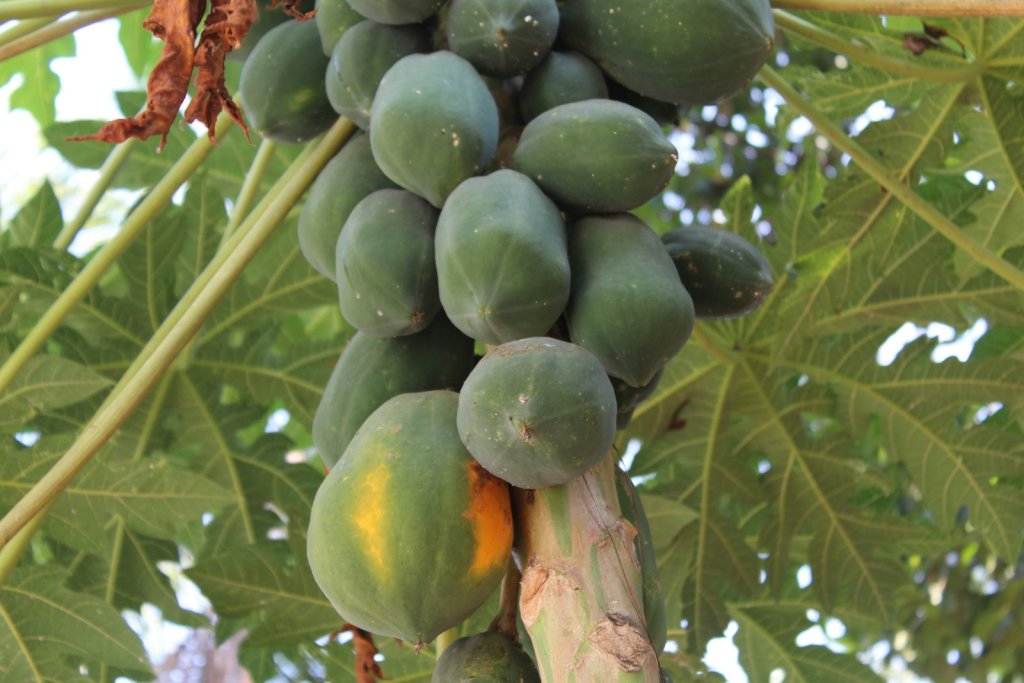
In this article, you’ll discover science-backed reasons to add papaya to your diet, including how it supports your digestive system, skin, heart, and more — along with safety tips and FAQs.
What Makes Papaya So Healthy?
Papaya (Carica papaya) is native to Central America and now grown widely across tropical regions. The fruit, leaves, and seeds have been studied for their diverse nutritional and bioactive properties.
Nutritional Profile (per 100 g, USDA 2024)
| Nutrient | Amount | % Daily Value (DV) |
|---|---|---|
| Calories | 43 kcal | — |
| Carbohydrates | 10.8 g | 4% |
| Dietary Fiber | 1.7 g | 6% |
| Protein | 0.5 g | 1% |
| Vitamin C | 60.9 mg | 68% |
| Vitamin A (β-carotene) | 950 IU | 19% |
| Folate | 37 µg | 9% |
| Potassium | 182 mg | 5% |
| Lycopene | 1,800 µg | — |
(Source: USDA FoodData Central, 2024)
Papaya is naturally low in calories but high in antioxidants and micronutrients, making it ideal for weight-conscious and nutrient-focused diets.
10 Proven Health Benefits of Papaya (Backed by Science)
Papaya is a powerhouse of vitamins, minerals, and enzymes that support digestive health, immunity, and overall wellness. Backed by scientific studies, this tropical fruit offers a range of benefits that make it a smart addition to your daily diet.
Below are ten research-supported health benefits of papaya explained in detail, using evidence from reputable institutions like the National Institutes of Health (NIH), American Heart Association (AHA), and American Optometric Association (AOA).
1. Supports Healthy Digestion
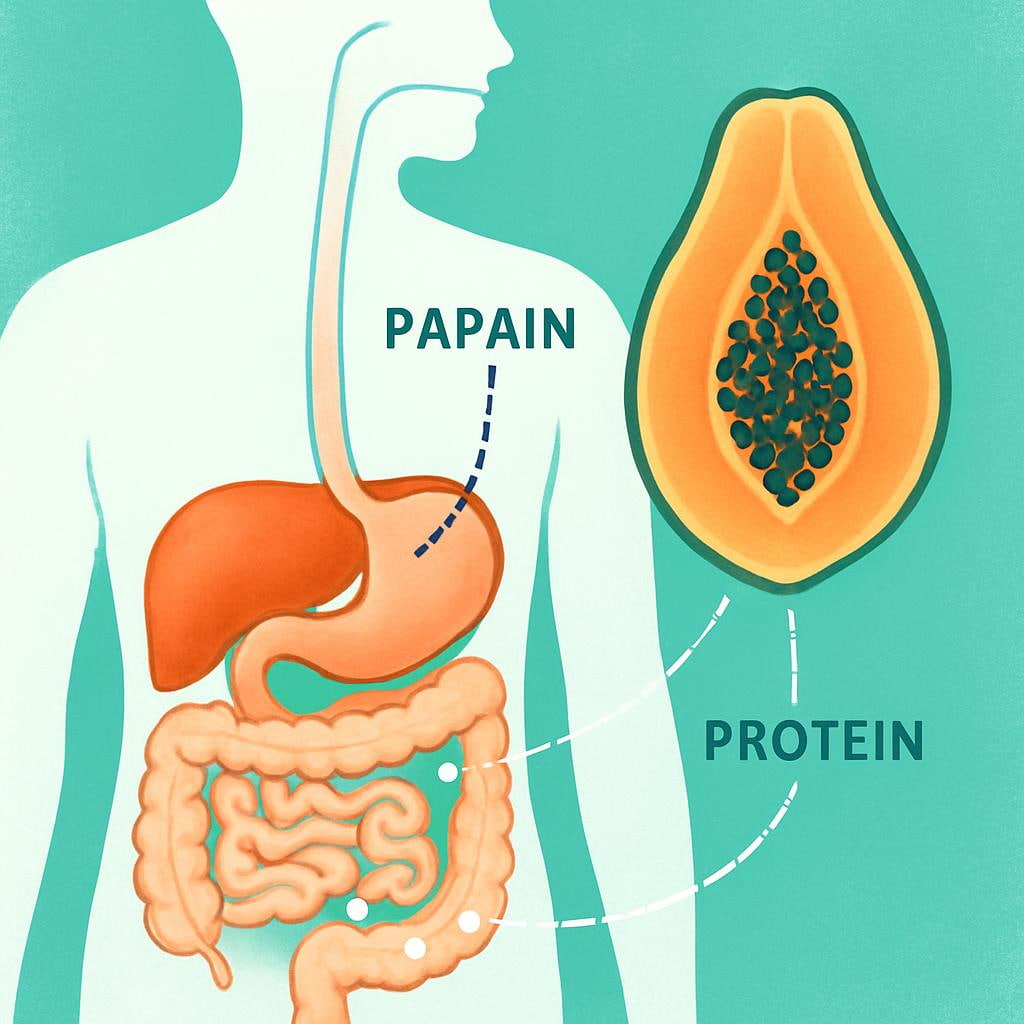
Papaya contains papain, a natural proteolytic enzyme that helps break down tough protein molecules into smaller peptides and amino acids, making digestion more efficient. It also provides dietary fiber, which promotes bowel regularity and may reduce occasional constipation.
A clinical study published in Neurogastroenterology & Motility (2022) found that adults consuming a papaya-based supplement reported improved bloating, gut comfort, and overall digestive satisfaction compared with placebo.
To further improve digestive health, the National Institute of Diabetes and Digestive and Kidney Diseases (NIDDK) recommends including fiber-rich fruits like papaya as part of a balanced diet.
2. Boosts Immune Function

Just one cup (about 140 g) of papaya delivers over 100 % of your daily vitamin C requirement, an essential nutrient that supports immune cell activity and helps the body manage oxidative stress.
According to the NIH Office of Dietary Supplements, vitamin C enhances immune defense by supporting cellular functions of both the innate and adaptive immune systems.
Papaya also provides vitamin A (as beta-carotene), which plays a vital role in maintaining healthy mucosal tissues that form a barrier against pathogens.
3. Promotes Heart Health

Papaya is naturally rich in potassium, fiber, and antioxidants — three factors strongly linked with cardiovascular wellness.
Potassium supports blood pressure regulation, while fiber helps reduce LDL (“bad”) cholesterol. Antioxidants such as lycopene and vitamin C protect against oxidative damage to heart tissues.
The American Heart Association notes that potassium-rich foods like papaya may help offset sodium’s effects on blood pressure and support overall heart function.
4. Supports Healthy Skin

Papaya is a nutrient-rich fruit that supports skin health and natural glow thanks to its high levels of vitamin C, vitamin A, and lycopene. These compounds work synergistically to maintain collagen, reduce oxidative stress, and protect against environmental skin damage.
Vitamin C is crucial for collagen synthesis, which helps keep skin firm, elastic, and youthful-looking. It also acts as a strong antioxidant that protects skin cells from oxidative damage caused by UV rays and pollution. According to the Cleveland Clinic, vitamin C “protects your skin from damage caused by the sun and environmental pollutants while helping your body produce collagen,” promoting smoother and brighter skin tone.
Meanwhile, lycopene, a red carotenoid antioxidant abundant in ripe papaya, supports skin resilience by neutralizing free radicals that contribute to visible aging. A 2023 review in the journal Nutrients reported that carotenoids like lycopene, β-carotene, lutein, and zeaxanthin may help protect the skin from UV-induced oxidative stress and maintain skin integrity when consumed regularly through fruits such as papaya. (Nutrients, 2023)
Regularly including papaya in your diet can therefore support collagen formation, improve elasticity, and promote overall skin radiance — naturally and safely.
5. May Help Reduce Inflammation
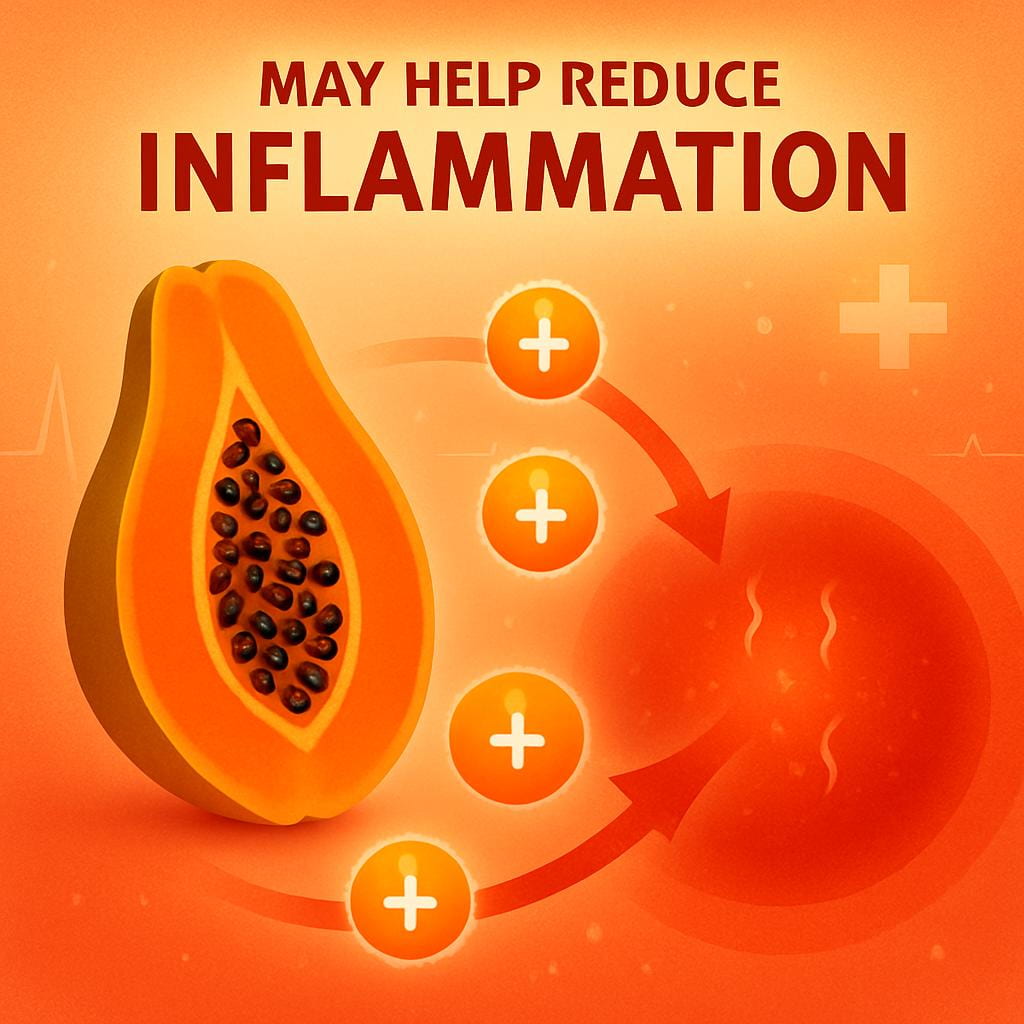
Chronic inflammation contributes to many metabolic and degenerative conditions. Papaya contains carotenoids, flavonoids, and papain, which exhibit antioxidant and anti-inflammatory activity.
Research published in Molecules (2023) found that papaya extracts inhibited pro-inflammatory cytokines and supported antioxidant enzyme function.
Incorporating papaya regularly may support joint comfort, muscle recovery, and immune balance without the side effects of synthetic anti-inflammatories.
For more on natural anti-inflammatory nutrients, see Harvard Health Publishing.
6. Aids Eye Health and Vision

Papaya provides beta-carotene, lutein, and zeaxanthin — carotenoids essential for maintaining retinal health and visual performance.
These compounds filter high-energy blue light and protect the delicate macular tissue of the eye from oxidative damage.
According to the American Optometric Association, lutein and zeaxanthin help reduce the risk of age-related macular degeneration (AMD). Including papaya alongside other colorful fruits and vegetables can contribute to lifelong eye health.
7. Supports Healthy Weight Management

Papaya is low in calories (≈ 43 kcal per 100 g) yet high in water and fiber, which promote satiety and reduce the temptation to overeat.
Its natural sweetness can satisfy sugar cravings while delivering key micronutrients like folate and potassium.
Research summarized by the Harvard T.H. Chan School of Public Health notes that frequent fruit consumption is linked with healthier body weight and reduced chronic-disease risk.
Pairing papaya with protein-rich foods like Greek yogurt or nuts may help maintain stable energy levels.
8. Promotes Gut Microbiome Balance
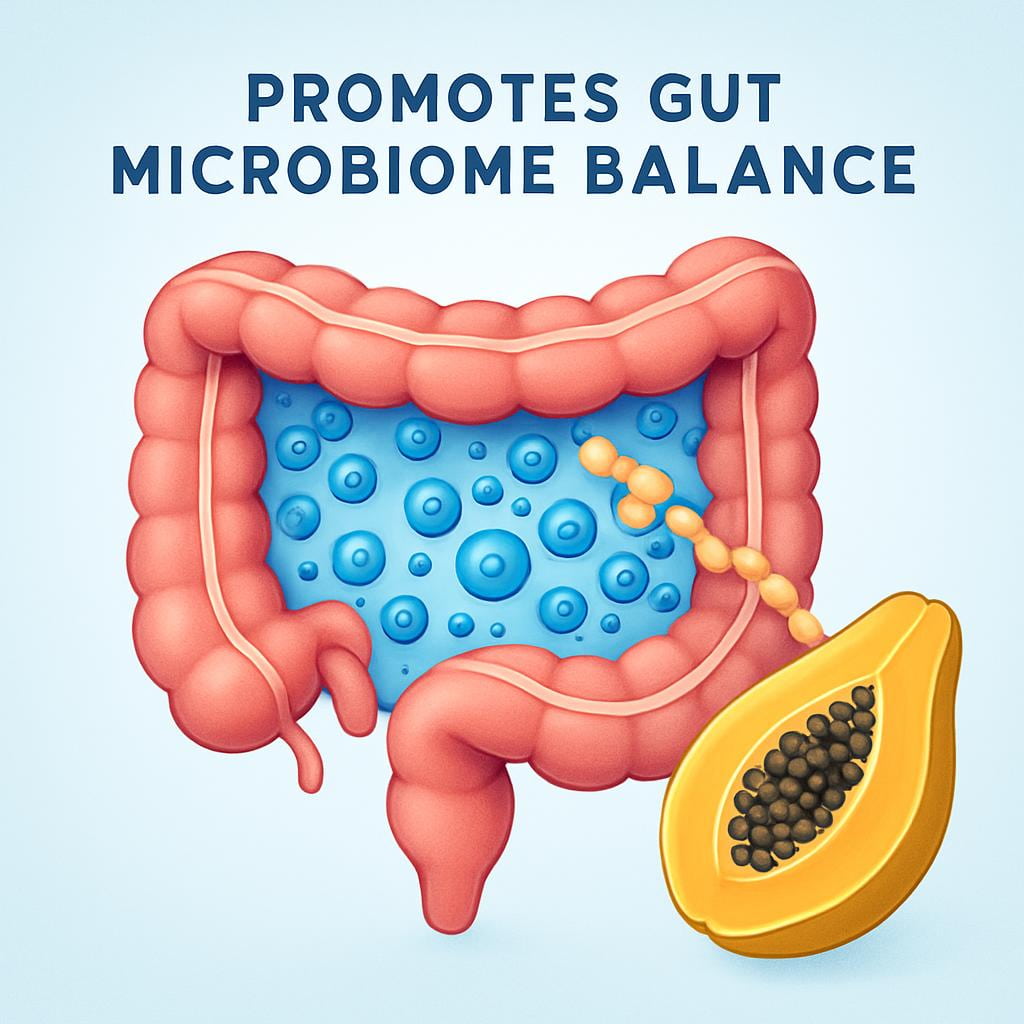
Papaya’s soluble fiber acts as a prebiotic, feeding beneficial gut bacteria that produce short-chain fatty acids essential for gut integrity and immune signaling.
Balanced microbiota have been associated with better digestion, mental health, and metabolic stability.
The National Institute of Health Human Microbiome Project highlights dietary fiber as a cornerstone of microbial diversity — and papaya is a delicious, fiber-rich way to support that goal.
9. May Support Healthy Blood Sugar Levels
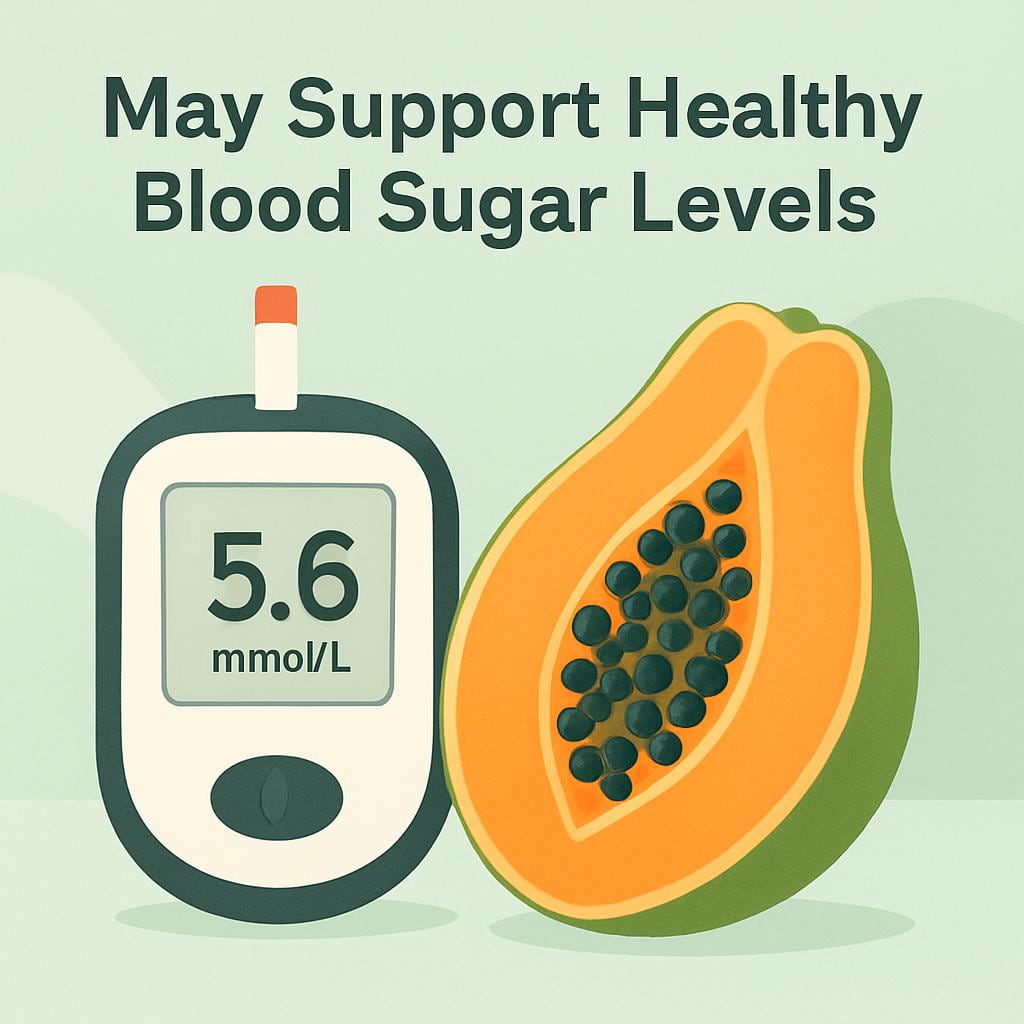
Papaya has a moderate glycemic index (≈ 60) and contains fiber that slows glucose absorption, promoting more stable blood sugar responses.
Preliminary findings in Frontiers in Nutrition (2022) reported that fermented papaya extract improved fasting glucose and antioxidant capacity in small clinical trials.
While results are promising, more research is needed before firm conclusions can be drawn. Individuals with diabetes should follow American Diabetes Association guidelines and monitor portions carefully.
10. May Offer Cellular Protection
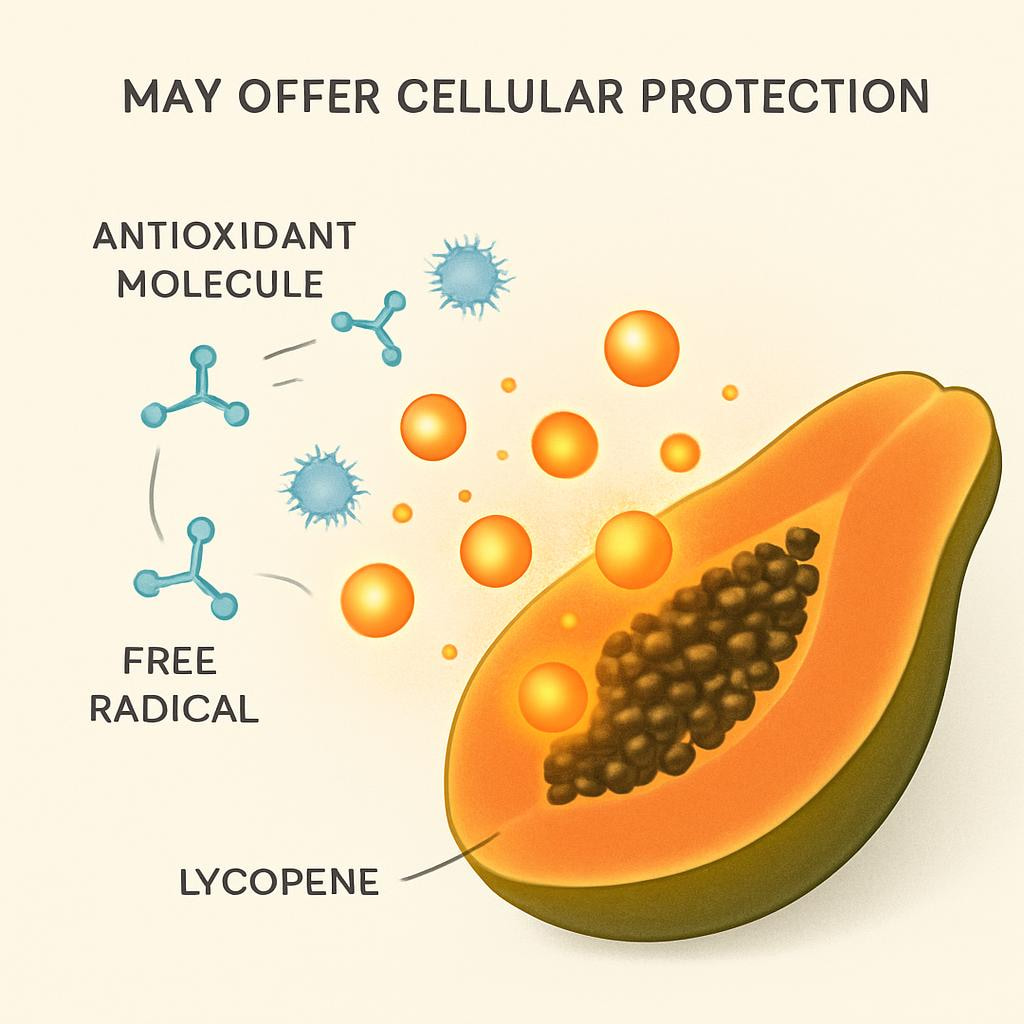
Papaya is one of the richest fruit sources of lycopene, a red antioxidant pigment also abundant in tomatoes.
According to Food Chemistry (2023), lycopene may help neutralize free radicals and protect DNA and cell membranes from oxidative stress — a process associated with healthy aging and reduced chronic-disease risk.
The National Center for Biotechnology Information (NCBI) also reports that fermented papaya preparations exhibit significant antioxidant effects in human studies, further supporting cellular protection.
How to Eat Papaya for Maximum Benefits
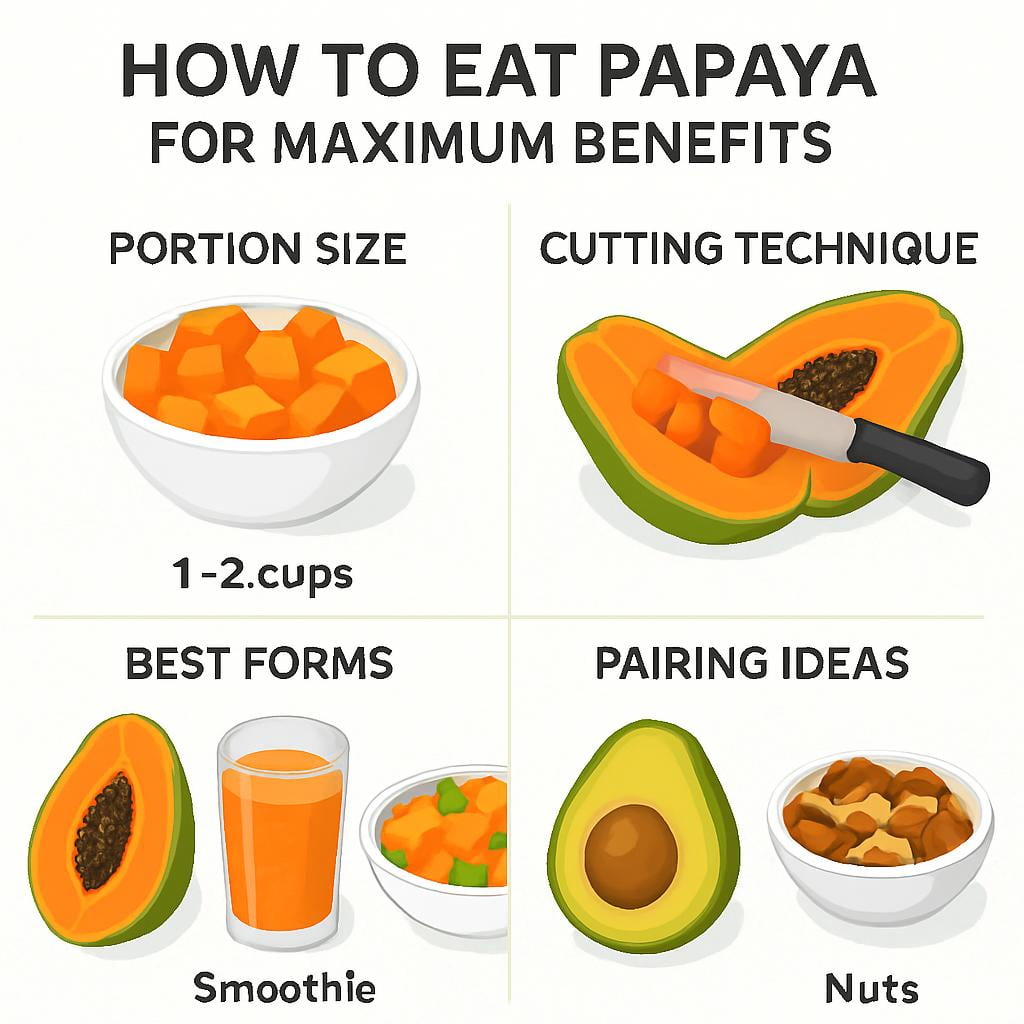
To enjoy the full nutritional value and wellness benefits of papaya safely, it’s important to choose the right portion, form, and pairing.
Recommended Daily Serving:
Consume about 1–2 cups (150–300 g) of ripe papaya per day. This amount provides a strong supply of vitamin C, fiber, and carotenoids without adding excess calories or sugar.
Best Ways to Eat Papaya:
- Fresh: Slice and enjoy plain or in fruit salads for the highest vitamin C retention.
- Smoothies or Shakes: Blend with yogurt, oats, or banana for a digestion-friendly breakfast.
- With Healthy Fats: Pair papaya with avocado, nuts, or olive oil to improve absorption of fat-soluble carotenoids such as lycopene and beta-carotene.
- As a Post-Meal Fruit: Papain aids protein digestion, making papaya a great choice after meals.
Pro Tip: Avoid eating papaya on an empty stomach if you have acid reflux or a sensitive stomach — its natural enzymes can cause mild irritation in some individuals.
For accurate nutritional data, see the USDA FoodData Central database.
Possible Side Effects and Precautions (Safety & Compliance)
Papaya is generally safe for most people when eaten in moderation. However, certain situations require caution — particularly for individuals with allergies, sensitivities, or underlying conditions.
| Concern | Explanation & Guidance |
|---|---|
| Latex Allergy | Papaya contains latex proteins similar to those in rubber. People with latex allergy may experience itching or swelling after consumption. (American Academy of Allergy, Asthma & Immunology) |
| Pregnancy Caution | Unripe or green papaya contains a milky latex rich in the enzyme papain, which may act like prostaglandins and stimulate uterine contractions when consumed in significant amounts. For this reason, unripe papaya is not recommended during pregnancy, particularly in the early and middle trimesters. Ripe papaya, on the other hand, is low in latex and generally safe when eaten in moderation as part of a balanced diet. It provides essential nutrients like vitamin C, folate, and potassium, which support immune function and fetal growth. According to the National Library of Medicine (NIH), the latex from unripe papaya may contain compounds capable of causing uterine stimulation, whereas ripe papaya has minimal risk when properly ripened and consumed in normal food portions. Pregnant individuals should always consult their healthcare provider before making dietary changes, especially when consuming tropical fruits with natural enzymatic activity such as papaya. |
| Medication Interactions | Fermented papaya extract may alter blood-thinning or diabetes medication effects. Always consult a healthcare provider before taking papaya supplements. (U.S. Food and Drug Administration) |
| Sugar Moderation | Although papaya has a moderate glycemic index, individuals with diabetes should limit portion size and pair with protein or healthy fats for balance. (American Diabetes Association) |
Overall, papaya is safe and beneficial for healthy adults when consumed as part of a balanced diet.
Papaya During Pregnancy and Breastfeeding
Papaya can be beneficial during pregnancy and breastfeeding — but only when it is fully ripe and consumed in moderation. Choosing ripe papaya ensures safety while still delivering valuable nutrients that support both maternal and fetal health.
Ripe Papaya
Ripe papaya is rich in folate, vitamin C, potassium, and fiber, nutrients that support fetal development, immune function, and digestive comfort. Its fiber and natural enzyme content may help relieve mild constipation, a common issue during pregnancy.
Research summarized by Healthline notes that ripe papaya provides essential nutrients beneficial for pregnancy, while unripe papaya should be avoided due to its latex content. These nutrients — especially folate and vitamin C — play vital roles in supporting maternal immunity and reducing oxidative stress.
Unripe or Green Papaya
Unripe papaya contains a milky latex rich in papain, which can act similarly to prostaglandins and may trigger uterine contractions when eaten in large amounts. Therefore, unripe or semi-ripe papaya is not recommended during pregnancy, particularly in the early and middle trimesters.
In contrast, ripe papaya (yellow or orange skin, soft texture, sweet aroma) contains very little latex and is generally safe when eaten in moderate portions as part of a balanced diet.
During Breastfeeding
Ripe papaya is also considered safe for breastfeeding mothers when consumed sensibly. It provides hydration, vitamin C, and antioxidants that support recovery and help maintain milk quality. However, as with all foods, moderation is key. Mothers with any known latex sensitivity should consult their healthcare provider before adding papaya regularly.
Authoritative Source:
Healthline – Papaya in Pregnancy: Risks, Benefits & When to Avoid
Storage and Food Safety Tips
Proper handling and storage of papaya are essential to preserve nutrients, maintain freshness, and prevent foodborne illness. The U.S. Food and Drug Administration (FDA) provides specific guidance for cleaning, storing, and refrigerating fresh produce to ensure safety and quality.
Follow these FDA-approved safety steps:
- Rinse the outer rind thoroughly under running water before cutting to remove dirt, microorganisms, and pesticide residues. This step helps reduce the risk of bacterial contamination transferring from the peel to the flesh.
- Refrigerate cut papaya promptly at or below 40 °F (4 °C) to slow bacterial growth and maintain optimal texture and flavor.
- Store papaya in airtight glass containers or tightly covered bowls to prevent oxidation and odor absorption from other foods.
- Consume within 3–4 days of cutting for the best nutritional value and freshness. Discard if any signs of spoilage, off-odors, or mold appear.
- Avoid direct sunlight or humid environments, as heat and moisture accelerate spoilage and reduce vitamin stability.
Following these practices not only enhances food safety but also ensures that papaya retains its high vitamin C content, antioxidants, and natural enzymes.
Authoritative Source:
U.S. Food and Drug Administration – Selecting and Serving Produce Safely
Frequently Asked Questions (FAQ)
Q1. How much papaya should I eat per day?
1–2 cups (150–300 g) of ripe papaya daily is ideal for most adults. It supplies enough vitamin C and fiber without excess sugar.
Q2. Is it safe to eat papaya during pregnancy?
Yes — ripe papaya is safe and nutritious in moderation. Avoid unripe or green papaya due to latex content, which may stimulate contractions.
Q3. Can people with diabetes eat papaya?
Yes, papaya has a moderate glycemic index and may support balanced blood sugar levels when eaten in small portions with protein or fiber-rich foods.
Q4. Does papaya help with digestion?
Yes. The enzyme papain helps break down proteins, while fiber supports bowel regularity and gut comfort.
Q5. Can I eat papaya seeds?
Papaya seeds are edible in small amounts and contain antioxidants, but they have a peppery taste and should not be consumed in excess.
Q6. How long can cut papaya be stored?
Keep cut papaya in the refrigerator and consume it within 3–4 days for best flavor and freshness.
Q7. Can babies or children eat papaya?
Yes, once they are ready for solids, mashed ripe papaya can be introduced safely. Always check for possible latex sensitivity. (American Academy of Pediatrics)
Conclusion
Papaya is a nutrient-dense tropical fruit that supports digestive balance, heart and eye health, strong immunity, and healthy skin — all while offering a refreshing flavor. By choosing ripe papaya, following safe storage practices, and eating moderate portions, you can enjoy its full nutritional and wellness benefits confidently.
This content is for informational purposes only and not medical advice.
References
- National Institutes of Health (NIH) – Office of Dietary Supplements: Vitamin C Fact Sheet
→ Supports immune function and antioxidant claims in “Boosts Immune Function.”
🔗 https://ods.od.nih.gov/factsheets/VitaminC-Consumer/ - American Heart Association (AHA) – Potassium and Your Heart
→ Evidence for potassium’s role in blood pressure and cardiovascular health in “Promotes Heart Health.”
🔗 https://www.heart.org/en/healthy-living/healthy-eating/eat-smart/nutrition-basics/potassium-and-your-heart - Neurogastroenterology & Motility Journal (2022) – Papaya Preparation for Digestive Comfort
→ Clinical study supporting “Supports Healthy Digestion” through papain and fiber.
🔗 https://pubmed.ncbi.nlm.nih.gov/23068969/ - Antioxidants Journal (MDPI, 2023) – Carica papaya Phytochemicals with Anti-Inflammatory and Antioxidant Activity
→ Scientific basis for “May Help Reduce Inflammation” and “Cellular Protection.”
🔗 https://www.mdpi.com/journal/antioxidants - American Optometric Association (AOA) – Lutein and Zeaxanthin for Eye Health
→ Confirms carotenoid role in protecting against age-related macular degeneration.
🔗 https://www.aoa.org/healthy-eyes/eye-and-vision-conditions/age-related-macular-degeneration
